

  |
|
|
||||||||||||||||||||||
|
FMS FEATURE... June 24, 2015 James Horner: An Appreciation Titanic composer mourned, remembered, eulogized by Jon Burlingame 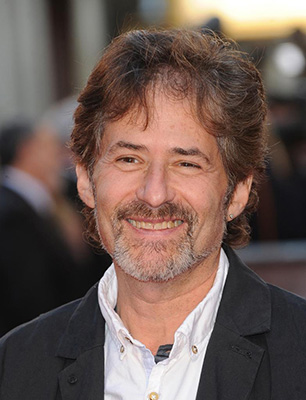 Horner, 61, an experienced pilot, was killed when his single-engine craft crashed in the Los Padres National Forest north of Santa Barbara. A statement released late Tuesday by his agents said: "Our thoughts and prayers are with James' family at this difficult time, and also with the millions of people around the world who loved his music. A shining light has been extinguished, which can never be replaced.... For more than three decades, his unique creative genius made an indelible imprint on each of our lives and on those of the entire Hollywood community.... We take comfort in the belief that in his last moments, James was doing something from which he derived such great joy. His spirit will continue to soar, and he will be with us always." Added Paul Williams, the president of ASCAP: "We have lost a true giant in the world of film composing. James was masterful at creating music that moved us in the most heartfelt ways, with depth and passion. His work added immeasurably to the success of the many beautiful films he scored. All of us at ASCAP will miss him, but we know his music and legacy, indeed his heart, will go on." Director Ron Howard, who worked with Horner on seven films including Cocoon, Apollo 13 and A Beautiful Mind, called him a "brilliant composer.... My heart aches for his loved ones." Celine Dion, who sang Horner's Titanic song to best-selling prominence, said "he will always be a great composer in our hearts. James played an important part in my career. We will miss him." Composers also eulogized him. Songwriter Diane Warren wrote: "He will be remembered in history as one of the greatest film composers of all time. It is sad for us that we couldn't hear all the great music that was yet to come." Fellow Oscar winner Alan Menken said: "I count James Horner among the very best composers of our generation. His work is stirring, emotionally powerful and broadly evocative. I will always cherish the memory of him and his wonderful work." John Debney wrote, "Perhaps God needed someone to help write His music. Godspeed Maestro." 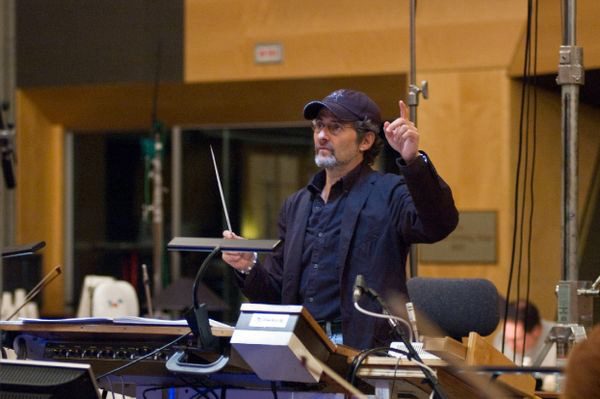 Horner scoring Avatar in 2009 Everyone, it seems, has a favorite Horner score. For many, it's Titanic, the music that he wrote for James Cameron's 1997 epic that won the hearts of millions of filmgoers around the world. Cameron later said "music was such an integral part of the dramatic and emotional impact of Titanic.... The themes were far beyond 'good,' they were everything I had dreamed, perfectly capturing the aching, bittersweet heart of the film." Horner's approach to a drama set in 1912 was unconventional, adding synthesizers and ethereal voice to the traditional orchestra, and coloring it with what he called the "moody, modal and timeless quality" of Irish flavors. Titanic won Oscars for best score and best song ("My Heart Will Go On," with lyrics by Will Jennings) and, at 30 million copies sold worldwide, is the biggest-selling predominantly orchestral soundtrack of all time. Countless listenings later, it's still haunting, still compelling, still touching. 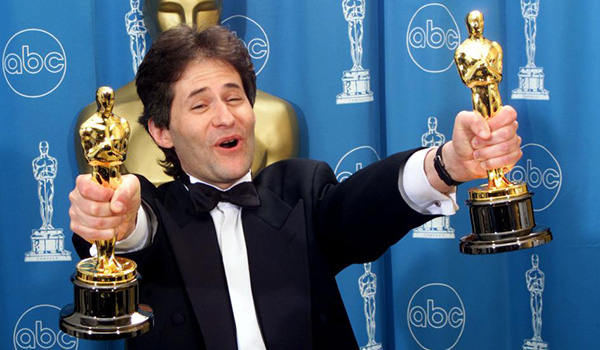 Horner wins 1998 Oscars for Titanic score and song But Titanic was just one of more than 100 film scores Horner composed over 35 years in the business. The son of production designer Harry Horner, he studied at London's Royal College of Music before returning to L.A. and more studies at USC and UCLA before launching a career in films, first on American Film Institute shorts and then at Roger Corman's company, doing low-budget films like Battle Beyond the Stars (1980). His score for Star Trek II: The Wrath of Khan (1982) clearly demonstrated that an important new voice had arrived on the scene. His energetic music, with its thrilling brass fanfares and nautical-adventure motifs, helped to propel the Enterprise crew into profitability and thus ensure the future of the franchise. As Jeff Bond wrote in The Music of Star Trek, Horner's work "was in many ways the most moving and emotionally direct score in the Star Trek canon." 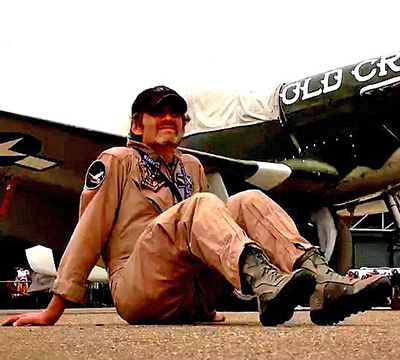 Horner preparing to fly in a vintage plane featured in the documentary The Horsemen Cometh (2010) But Horner also proved that he was comfortable in any genre: pop-rock for 48 Hrs. (1982), Russian gestures for Gorky Park (1983) and delightful, child-friendly scores for the animated, Don Bluth-directed An American Tail (1986) and The Land Before Time (1988), which became the soundtracks to millions of youngsters' lives as they watched them again and again on VHS. "Somewhere Out There," from An American Tail, reached no. 2 on the Billboard charts and eventually won two Grammys, including Song of the Year, for Horner and lyricists Barry Mann and Cynthia Weil. He won another Grammy for Glory (1989), the Denzel Washington film about black soldiers during the Civil War, which innovatively employed the Harlem Boys Choir. He then received another Oscar nomination, for Field of Dreams (1989), which found the composer working in more intimate ways, playing the piano himself and applying synthesizers creatively to suggest Kevin Costner's magical cornfield. The Rocketeer (1991) remains a favorite of many Horner fans, a richly melodic accompaniment to the cult-favorite comic-book adaptation. Sneakers (1992) is a personal favorite of this writer, a truly unique combination of orchestra, fascinating choral textures and Branford Marsalis' saxophone; as is his music for the chess movie Searching for Bobby Fischer (1993), a wistful, piano-based score whose musical depth matches the film's own insights. By the mid-1990s, Horner was on the A-list, one of the most sought-after composers in film. And with good reason: With Legends of the Fall (1994), he created a romantic tapestry rooted in English folk tradition; with Apollo 13 (1995), a stirring, patriotic and suspenseful score that underlined the hopes and fears associated with that fateful moon mission, using Annie Lennox as his solo voice; and with Mel Gibson's 14th-century epic Braveheart (1995), for which he not only established the time and place with pipes, drums and whistles, but also composed a timeless love theme that still resonates with listeners. With A Beautiful Mind (2001), Horner revisited the concept of piano, orchestra and voice (this time the incomparable Charlotte Church), but perhaps never more brilliantly in attempting to convey the mathematical genius of the troubled John Nash (Russell Crowe). And with Avatar (2009), he designed the soundscape for an entire planet, employing voices, synthesizers and otherworldly sounds in addition to the traditional orchestra. "My primary musical goal is to provide the heart of the film," he told me at the time, an idea that applied to every film he scored. Horner recently returned to his classical roots. In November he premiered a double concerto for violin and cello in Liverpool, England, and this past March saw the London premiere of his concerto for four horns. Three film scores remain to be heard, later this year: Wolf Totem, which has already opened in Europe and the Far East; Southpaw, opening July 24; and The 33, due Nov. 13. 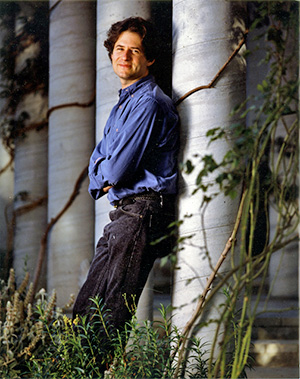 He is survived by his wife Sara and two daughters. Antoine Fuqua, who directed Southpaw, put it this way: "He was magical to work with, and I feel blessed that we had the opportunity to collaborate together.... We have lost a special soul who touched so many people through his art. Rest in peace my friend, you left us with the gift of your incredible music." ©2015 Jon Burlingame |
Search
Past Features
Feature Archives
|